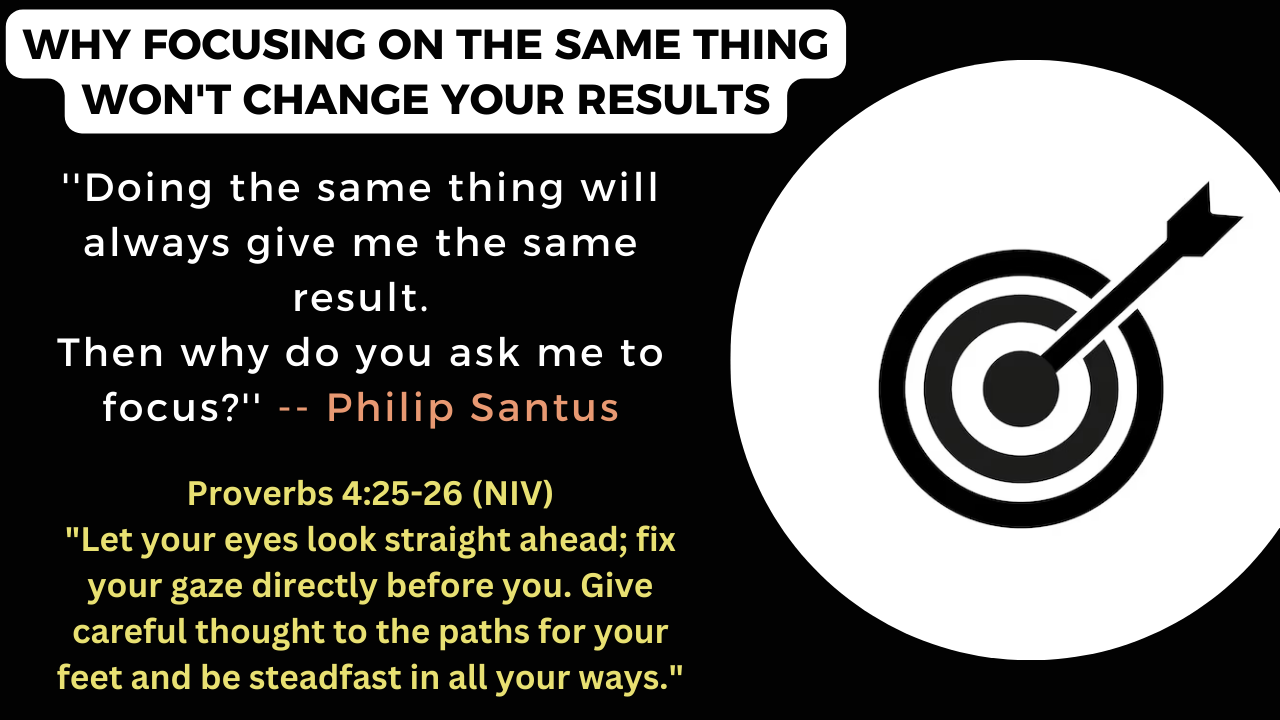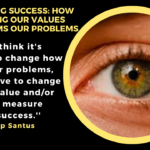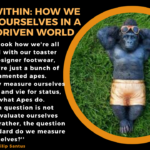(MY QUOTE)
”Doing the same thing will always give me the same result.
Then why do you ask me to focus?” — Philip Santus
Let’s examine the Biblical verses that relates to this quote and article.
Certainly, here are two Bible verses that reflect the concept behind the quote:
Proverbs 4:25-26 (NIV)
“Let your eyes look straight ahead; fix your gaze directly before you. Give careful thought to the paths for your feet and be steadfast in all your ways.”
This verse encourages mindful focus and intention in our actions, prompting us to carefully consider our path forward rather than getting stuck in ineffective habits.
Isaiah 43:18-19 (NIV)
“Forget the former things; do not dwell on the past. See, I am doing a new thing! Now it springs up; do you not perceive it? I am making a way in the wilderness and streams in the wasteland.”
This passage reminds us of the importance of letting go of old, unproductive ways and embracing new, fresh directions, much like breaking out of repetitive cycles to see different outcomes.
THE MEANING OF THE QUOTE, THE REAL CONCEPT BEHIND IT:
This quote highlights the paradox of persistence versus change, which is often seen in personal development and problem-solving. Let’s break it down into sections to understand the underlying issues and potential solutions.
Section 1: “Doing the same thing will always give me the same result.”
Interpretation:
This part speaks to the principle of consistency without variation, which aligns with Einstein’s notion that “insanity is doing the same thing over and over and expecting different results.” It emphasizes that repeating actions without adjustment leads to predictable, unchanging outcomes. This cycle often reflects a comfort zone or a habitual pattern that limits growth.
Solution:
To escape repetitive cycles and achieve new outcomes, it’s essential to:
- Identify Patterns: Reflect on routines or responses that haven’t yielded desired results. Analyze specific steps, mindsets, or habits in your current approach.
- Set Small Experiments: Introduce controlled changes to your actions. For example, if a writer feels uninspired by focusing on familiar themes, they might explore a different genre or style.
- Embrace Feedback Loops: Gather feedback on each new approach to see if it moves you closer to a goal. Incorporate productive responses into your plan and revise accordingly.
Section 2: “Then why do you ask me to focus?”
Interpretation:
This part questions the value of focusing if the method itself seems flawed or stagnant. If repetition yields the same result, focusing intensely on the wrong approach won’t break the cycle. The issue, therefore, isn’t a lack of focus but rather the absence of effective, creative change.
Solution:
To reconcile focus with the need for change:
- Redefine Focus: Focus isn’t about maintaining a rigid method but rather having clarity on the end goal. Redirect focus towards experimenting with new methods, learning from failures, and adjusting based on what works.
- Focus on Process, Not Just Outcome: Instead of fixating on repetitive tasks, concentrate on a strategy that incorporates flexibility and innovation. This adaptive focus encourages sustainable growth and allows room for discovery.
- Mindful Breaks: Taking intentional breaks from your usual patterns can inspire fresh ideas. You might find new perspectives through discussions, books, or other resources outside your typical focus area.
Bridging the Quote’s Insight and Effective Action
Ultimately, the quote invites us to reconsider how focus and effort align with creativity and adaptability. Focus should be paired with innovation, where persistence fuels experimentation rather than strict repetition.
Below are five books that explore themes related to breaking repetitive patterns, creating change, and the importance of adaptive focus for personal growth:
- “Atomic Habits: An Easy & Proven Way to Build Good Habits & Break Bad Ones” by James Clear
- Clear explains how small changes can break us out of ineffective patterns, emphasizing the role of intentional, incremental adjustments in achieving new results.
- “Mindset: The New Psychology of Success” by Carol S. Dweck
- Dweck’s work on growth versus fixed mindsets illustrates how changing our approach and beliefs about learning can lead to new outcomes and avoid repetitive, limiting cycles.
- “The Power of Habit: Why We Do What We Do in Life and Business” by Charles Duhigg
- Duhigg delves into the science of habits, helping readers understand how to change their routines and behaviors for different, more desirable results.
- “Switch: How to Change Things When Change Is Hard” by Chip Heath and Dan Heath
- This book provides practical strategies for creating change in situations where it feels difficult to break from established habits, highlighting the balance between focus and adaptability.
- “Essentialism: The Disciplined Pursuit of Less” by Greg McKeown
- McKeown’s book teaches the importance of focusing on what truly matters and eliminating unnecessary efforts that don’t bring new results, a valuable approach to avoiding the trap of repetitive, ineffective actions.
These books offer insights and actionable strategies for shifting focus and methods to create meaningful, lasting change.






